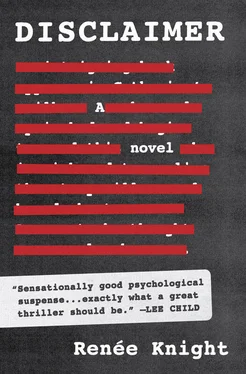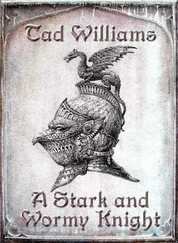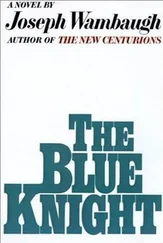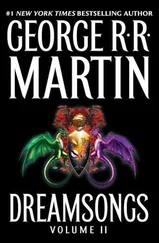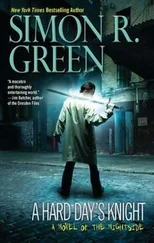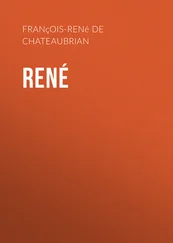Jonathan’s flat is at the top of a mansion block, prewar, built about ten years before I was born. There is no lift, but someone has thought about those of us who might struggle to reach the top and they have put a chair on each landing. I sat in every one. Onwards and upwards. I dragged myself up the last flight and then looked down, through the beautiful wrought-iron balustrade which curved and fell to the cold stone floor. A softly curving funnel through which a human might swallow-dive, not touching the edges, slipping through but still ending in a bloody mess at the bottom. I had a feeling then that I shouldn’t have come, that I had no right to intrude. This was Jonathan’s place.
The plant outside his front door was dead. It hadn’t been watered for some time. I put the key in the lock. There was probably a knack to it, but I didn’t have it and it seemed to take forever to get in, and all the time I was expecting someone to tap me on the shoulder and ask what I was doing there.
Once inside I was struck by the most terrible smell. Putrefying. Something rotten, something dying or dead. I went straight into the kitchen, assuming it must have been something in the bin, but that was empty. On the kitchen table was a vase of flowers. Dead, dried, crisp, just a green line around the vase where the water had once been. I hesitated, not sure it was my place to throw them out. I went into the sitting room and sat on Jonathan’s sofa and looked around. I could see the unmistakeable signs of femininity. More flowers on the small table by the window. Lifeless, ugly, their parched stems desiccated sticks crying to be put out of their misery. A woman’s touch. I left them where they were. I hadn’t put them there. They were nothing to do with me.
When I walked into Jonathan’s bedroom, I gagged from the smell. His bed was unmade, the duvet mussed and falling off. The cover was dark blue, the bottom sheet maroon. It reminded me of a school uniform, good dark colours that didn’t show the dirt. The smell came from the corner near Nancy’s desk. I approached it, hand clamped over my nose and mouth, and there it was. A body. Rotting. Neck broken, mouth open, teeth bared, giving off that inside-out stench of putrefaction. I should have known. Death. Always leaving its predatory stench, like a lusty tomcat long after it has left the scene. I found a plastic bag in the kitchen, and wearing it like a glove, picked up the whole thing, trap and mouse, and disposed of it in the kitchen bin.
I went back into the bedroom and sat at Nancy’s desk. It’s smaller than mine and the tops of my legs rubbed against its underside. It would have been even more of a squeeze for Jonathan, and I imagined his six-foot frame and his strong legs squished into what had been his mother’s space. I was pleased to see it had been taken care of. No rotting flowers there. No water rings from cups, or glasses of water, just an undisturbed film of dust. There were pieces of paper, neatly stacked on it, and a photograph of Nancy and me. Mum and Dad. Husband and wife. Two people in love. Two people who were loved.
I clicked the switch on the desk light, but the bulb had gone. And then I began my invasion. I pulled at the first drawer and looked inside: empty, apart from the odd pencil stub and leaky biro. I went through the others and found the same. The last drawer was the smallest. Tucked under the desk top it ran between the two pedestals, a slender place. It was locked. I put in the key, turned it, then slid back the chair and pulled open the drawer. And what an industrious place it was. Pens, pencil sharpener, pencils, a box of paper clips, three notebooks. They were the type Nancy used, blue-lined reporter’s pads, nothing special. She’d always carried one with her when she was writing, filling it with thoughts or sights which struck her, overheard conversations, that sort of thing. I flicked through one, but didn’t give it much attention. It was the manuscript which sat underneath the notebooks that interested me. I picked it up. “Untitled.” Someone else’s work then because Nancy always came up with her titles first, and it was dated long after I knew she had stopped writing. Was it Jonathan’s? I turned the page. But no, this manuscript was dedicated to Jonathan. He hadn’t written it. “To My Son, Jonathan” I read, and then my wife’s name typed at the bottom of the page, my wife proclaiming her authorship. A book, written in secret and locked away from my prying eyes.
Sticks and stones, I told myself, but I feared the words on those pages might actually break me. I wasn’t ready for them. There were other objects rattling around in that drawer, cuddling up to my wife’s manuscript: a Swiss Army knife; a half-empty pack of cigarettes; and a can of deodorant with a cheap, erotic name. I grabbed the deodorant and marched around the flat like a crazed pest controller, shooting “Wildcat” into the air, covering up the stench of dead animal and everything else that offended my senses. When I was calmer, I put the can back and picked up Nancy’s untitled work, holding it against my chest as if it was a small, trembling creature. I shouldn’t have taken it, it wasn’t mine to take, it was Jonathan’s. But I did take it. I left the notebooks, but took the manuscript. Jonathan would never know I’d been there, and I promised myself that I would return it as soon as I had read it.
“Mum, what do you want me to do with this stuff?” Catherine finishes her glass of wine and closes her eyes in irritation. Drinking at lunchtime is never a good idea but Robert had opened two bottles of their best wine, and she had been determined to join him and Nicholas in drinking it.
“Just take what you want and I’ll sort the rest,” she shouts back. Silence. She hears the thump of books and files being dumped on the floor of the spare room. She pushes her chair back, the impatient grind of its legs on the stone setting her teeth on edge.
“Coffee?” she hears Robert call to her retreating back.
Nicholas is sitting on the floor in the same position Catherine had been in at dawn.
“I don’t know what to take.” He looks bewildered.
“Well, just whatever you don’t want thrown out. We haven’t got the space anymore, Nick.” He nods, as if understanding, but she can tell he doesn’t quite get it.
“Don’t you want any of it?” And she hears the hurt in his voice. She has done it again. She has hurt him with her impatience and her brisk efficiency.
“Well,” she says gently, sitting down next to him, “let’s see.” She picks up a large manila envelope and peers inside. It’s full of Nicholas’s primary school reports, bound together with an elastic band. Should she take one out and read it? Would he like that? Nicholas’s school reports had always left her with a sinking feeling. What does it matter now though? He is twenty-five. Maybe now they can laugh about it, and she overcomes her resistance and reads a comment from Miss Charles. How well she remembers the permed head and thin lips of Nicholas’s form teacher. It was his last year at primary school and Catherine chooses the comment carefully.
“‘Nicholas is a popular member of the class, with both sexes,’” she says and smiles, leaving out the end of Miss Charles’s sentence: “… but he struggles to settle down to his tasks and his work suffers as a result.” For years, always the same story. Disappointing; more effort needed; he struggles to stay focused. Still, at least back then he had friends. There seem to have been fewer and fewer of them as the years have gone by.
“I’ll keep these,” and she hugs the reports to her chest as if she is fond of them. “How’s the flat?”
He shrugs. “All right.”
“Flatmates okay?”
Читать дальше
